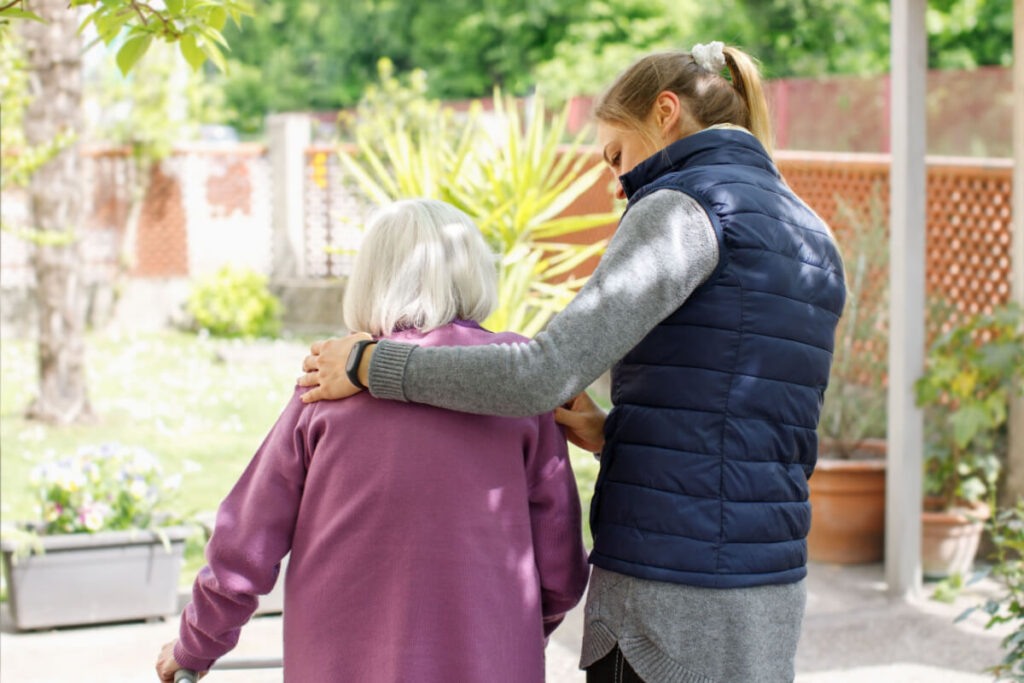Being a family caregiver can be an incredibly rewarding experience. However, it can also be physically, mentally, and emotionally draining, leading to a state of exhaustion known as caregiver burnout.
Not only can family caregiver burnout lead to anxiety or depression, but it can also create tensions between your loved one receiving care and other family members. For instance, feelings of resentment for having to provide care or anger toward other family members who aren’t involved in the caregiving journey. Often, a person doesn’t realize they’re experiencing burnout until it’s too late, so preventative measures are vital.
Peaceful Pines Senior Living understands the weight of caregiver burnout. Our senior living team wants to share tips to help you recognize when you might be experiencing caregiver burnout and how to prevent it.
Signs of Caregiver Burnout
Caregiver burnout is a state of physical, emotional, and mental exhaustion that can accompany the care of individuals. It often comes with stress, fatigue, anxiety, and even depression.
Think about your role as a caregiver, and consider the various tasks you must complete every day to support your loved one. For example:
- Preparing meals
- Assisting with activities of daily living, like bathing, getting dressed, or toileting
- Managing finances and/or medications
- Getting them to various appointments or other errands
These tasks can be taxing in any respect, whether you’re doing them for yourself or another person. In addition, balancing these tasks with your own needs and schedules can become incredibly challenging and, without support, inevitably leads to burnout.
Here are some signs to watch out for that might indicate you’re experiencing caregiver burnout:
- Chronic fatigue
- Sleep disorders
- Emotional instability or mood swings
- Anxiety and depression
- Loss of interest in activities once enjoyed
- Feeling irritable, hopeless, and overwhelmed
Prevention Strategies
Preventing caregiver burnout involves prioritizing self-care, setting boundaries, and utilizing support networks and resources.
1. Self-care: This includes maintaining a healthy diet, regular exercise, and adequate rest. Make time for activities you enjoy and ensure you get regular health check-ups.
2. Set Boundaries: It’s important to understand that you cannot do everything. Learn to delegate tasks and say no when necessary.
3. Seek Support: Don’t hesitate to ask for help from friends, family, or professional services. Caregiver support groups can provide a setting where you’re surrounded by others going through similar situations.
4. Relaxation Techniques: Practice mindfulness techniques such as meditation, deep breathing, or yoga, which can help manage stress and promote mental well-being.
Self-Care Tips for Caregivers
Self-care is not a luxury; it’s a necessity. Think of the act of self-care as a solidified part of your daily routine. For example, you wouldn’t skip your meals or shower, as you know it could lead to detrimental health issues. Utilize this method of thinking when it comes to taking time for yourself, and understand that a lack of self-care can lead to similar issues over time.
Here are some tips to get started:
- Prioritize Self-Care: Make time daily or weekly for activities that help you relax and recharge, whether it’s a quick meditation or your favorite hobby.
- Set Realistic Expectations: Understand that you cannot do everything for everyone all the time, even when providing care to a loved one. It’s okay to ask for help, and by reaching out for support, you’re ensuring your loved one receives the care they deserve, even if it comes from someone other than yourself.
- Find Joy: Maintain your hobbies and interests outside of caregiving, as this can provide a much-needed outlet for stress and give you moments of joy.
It’s Okay to Ask for Help
Knowing when to seek professional help is crucial. If you’re experiencing signs of depression or if your physical health is deteriorating, consult a healthcare professional. Choosing the right professional involves:
- Searching for professionals who specialize in caregiver mental health
- Asking for recommendations from trusted sources
- Seeking a professional who makes you feel comfortable and understood
Being a caregiver is a labor of love, but it’s essential to remember your well-being matters, too. Recognize the signs of caregiver burnout and take steps to prevent it. Seeking help is not a sign of weakness or failure but an act of strength. After all, taking care of yourself is part of caring for others.We invite you to contact Peaceful Pines Senior Living today to learn more about our senior living communities, care, and services.



